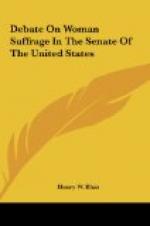The independence, equality, and dignity of all human souls is the fundamental assertion of those who believe in what we call human freedom. This principle will hardly be denied by any one, even by those who oppose the adoption of the resolution. But we are informed that infants, idiots, and women are represented by men. This cannot reasonably be claimed unless it be first shown that the consent of these classes has been given to such representation, or that they lack the capacity to consent. But the exclusion of these classes from participation in the Government deprives them of the power of assent to representation even when they possess the requisite ability; and to say there can be representation which does not presuppose consent or authority on the part of the principal who is represented is to confound all reason and to assert in substance that all actual power, whether despotic or otherwise, is representative, and therefore free. In this sense the Czar represents his whole people, just as voting men represent women who do not vote at all.
True it is that the voting men, by excluding women and other classes from the suffrage, by that act charge themselves with the trust of administering justice to all, even as the monarch whose power is based upon force is bound to rule uprightly. But if it be true that “all just government is founded upon the consent of the governed,” then the government of woman by man, without her consent, given in her sovereign capacity, if indeed she be an intelligent creature, and provided she be competent to exercise the power of suffrage, which is the sovereignty, even if that government be wise and just in itself, is a violation of natural right and an enforcement of servitude and slavery against her on the part of man. If woman, like the infant or the defective classes, be incapable of self-government, then republican society may exclude her from all participation in the enactment and enforcement of the laws under which she lives. But in that case, like the infant and the fool and the unconsenting subject of tyrannical forms of government, she is ruled and not represented by man.
Thus much I desire to say in the beginning in reply to the broad assumption of those who deny women the suffrage by saying that they are already represented by their fathers, their husbands, their brothers, and their sons, or to state the proposition in its only proper form, that woman whose assent can only be given by an exercise of sovereignty on her part is represented by man who denies and by virtue of power and possession refuses to her the exercise of the suffrage whereby that representation can be made valid.
The claim, then, of the minority of the committee that woman is represented by the other sex is not well founded, and is based upon the same assumption of power which lies at the base of all government anti-republican in form. It can not be claimed that she is as a free being already represented, for she can only be represented according to her will by the exercise of her will through the suffrage itself.




